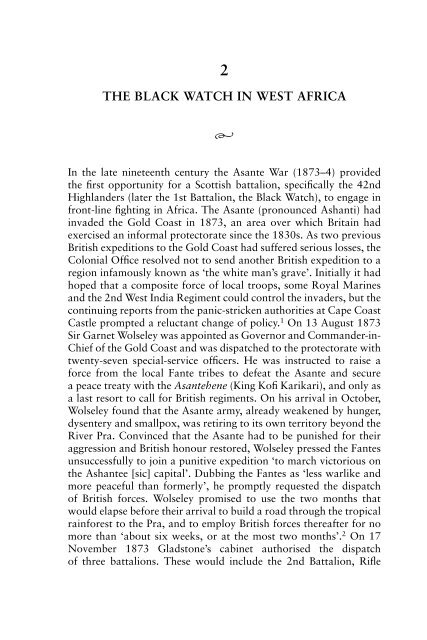The Scottish soldier and Empire, 1854-1902 - Reenactor.ru
The Scottish soldier and Empire, 1854-1902 - Reenactor.ru
The Scottish soldier and Empire, 1854-1902 - Reenactor.ru
Create successful ePaper yourself
Turn your PDF publications into a flip-book with our unique Google optimized e-Paper software.
2<br />
THE BLACK WATCH IN WEST AFRICA<br />
1<br />
In the late nineteenth century the Asante War (1873–4) provided<br />
the first opportunity for a <strong>Scottish</strong> battalion, specifically the 42nd<br />
Highl<strong>and</strong>ers (later the 1st Battalion, the Black Watch), to engage in<br />
front-line fighting in Africa. <strong>The</strong> Asante (pronounced Ashanti) had<br />
invaded the Gold Coast in 1873, an area over which Britain had<br />
exercised an informal protectorate since the 1830s. As two previous<br />
British expeditions to the Gold Coast had suffered serious losses, the<br />
Colonial Office resolved not to send another British expedition to a<br />
region infamously known as ‘the white man’s grave’. Initially it had<br />
hoped that a composite force of local troops, some Royal Marines<br />
<strong>and</strong> the 2nd West India Regiment could control the invaders, but the<br />
continuing reports from the panic-stricken authorities at Cape Coast<br />
Castle prompted a reluctant change of policy. 1 On 13 August 1873<br />
Sir Garnet Wolseley was appointed as Governor <strong>and</strong> Comm<strong>and</strong>er-in-<br />
Chief of the Gold Coast <strong>and</strong> was dispatched to the protectorate with<br />
twenty-seven special-service officers. He was inst<strong>ru</strong>cted to raise a<br />
force from the local Fante tribes to defeat the Asante <strong>and</strong> secure<br />
apeace treaty with the Asantehene (King Kofi Karikari), <strong>and</strong> only as<br />
a last resort to call for British regiments. On his arrival in October,<br />
Wolseley found that the Asante army, already weakened by hunger,<br />
dysentery <strong>and</strong> smallpox, was retiring to its own territory beyond the<br />
River Pra. Convinced that the Asante had to be punished for their<br />
aggression <strong>and</strong> British honour restored, Wolseley pressed the Fantes<br />
unsuccessfully to join a punitive expedition ‘to march victorious on<br />
the Ashantee [sic] capital’. Dubbing the Fantes as ‘less warlike <strong>and</strong><br />
more peaceful than formerly’, he promptly requested the dispatch<br />
of British forces. Wolseley promised to use the two months that<br />
would elapse before their arrival to build a road through the tropical<br />
rainforest to the Pra, <strong>and</strong> to employ British forces thereafter for no<br />
more than ‘about six weeks, or at the most two months’. 2 On 17<br />
November 1873 Gladstone’s cabinet authorised the dispatch<br />
of three battalions. <strong>The</strong>se would include the 2nd Battalion, Rifle

















